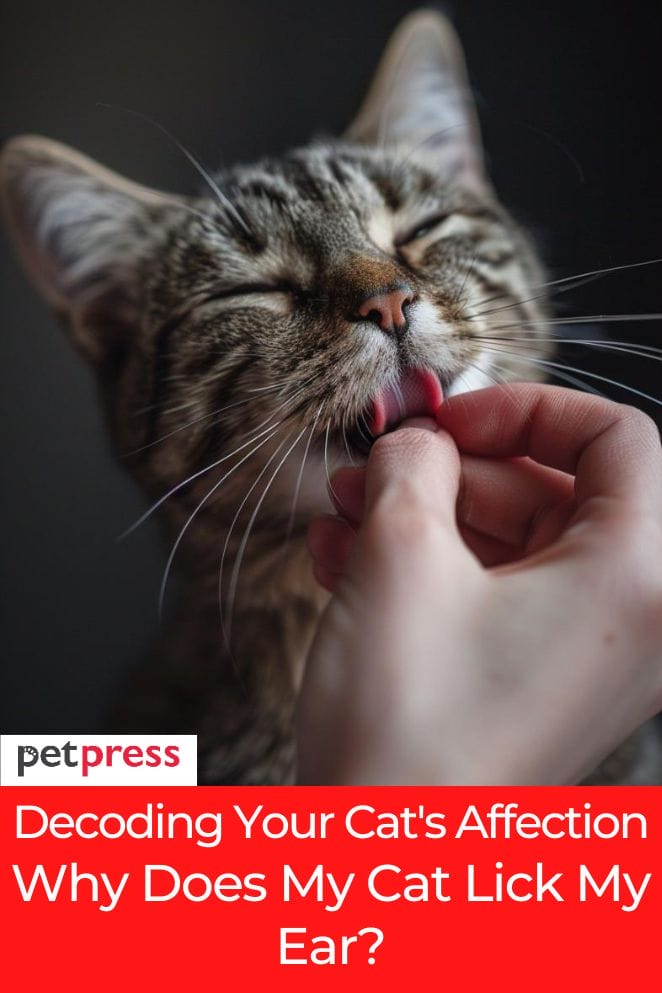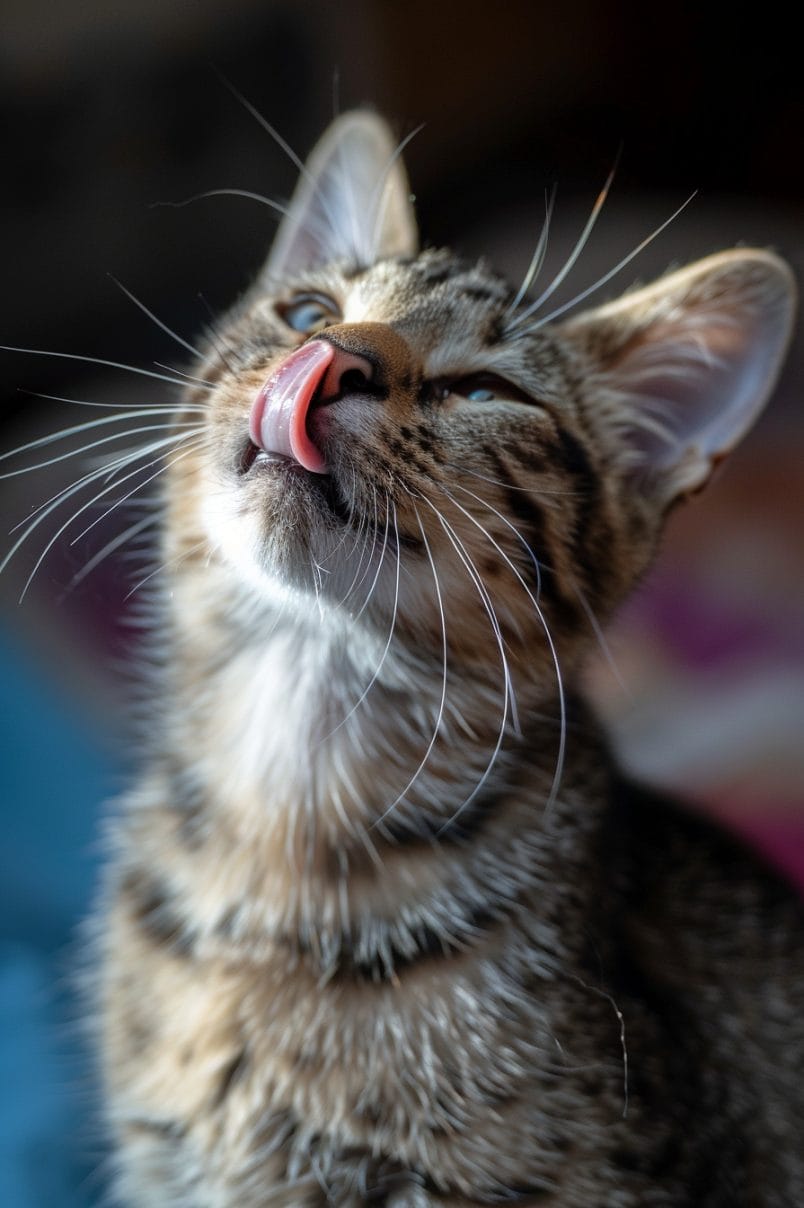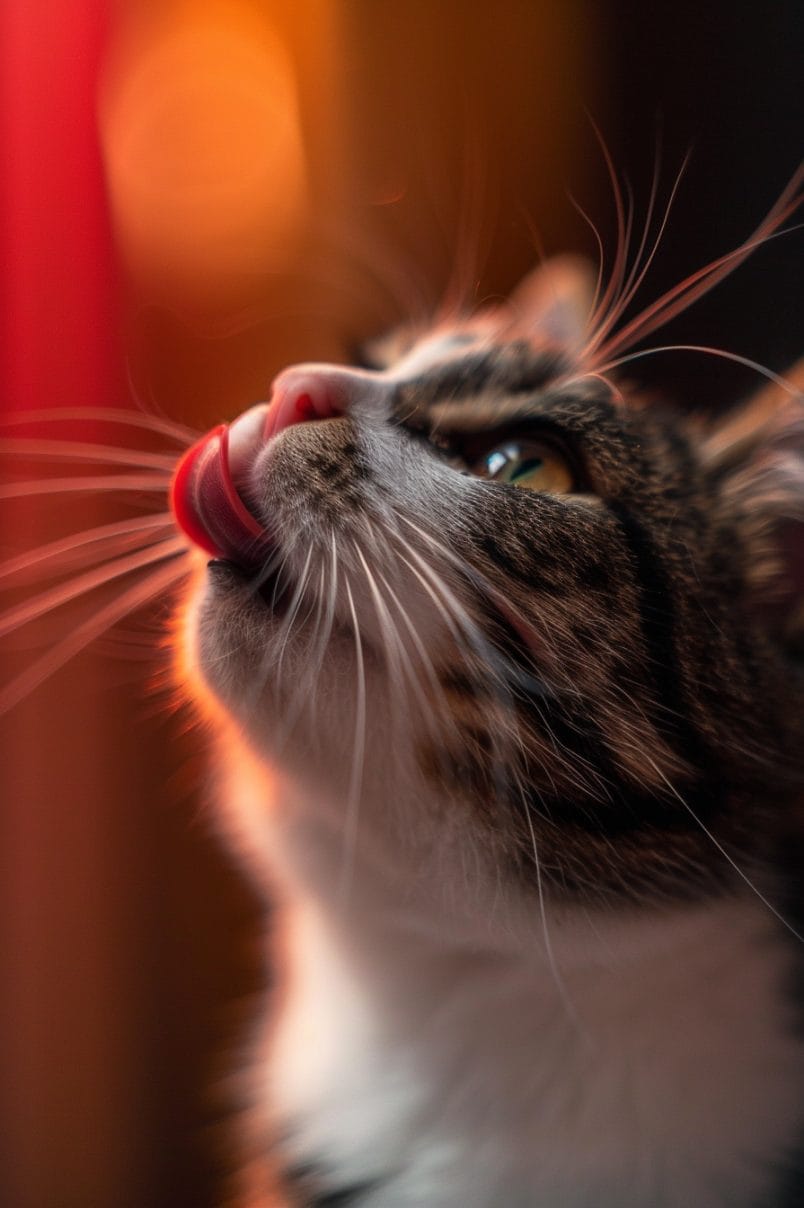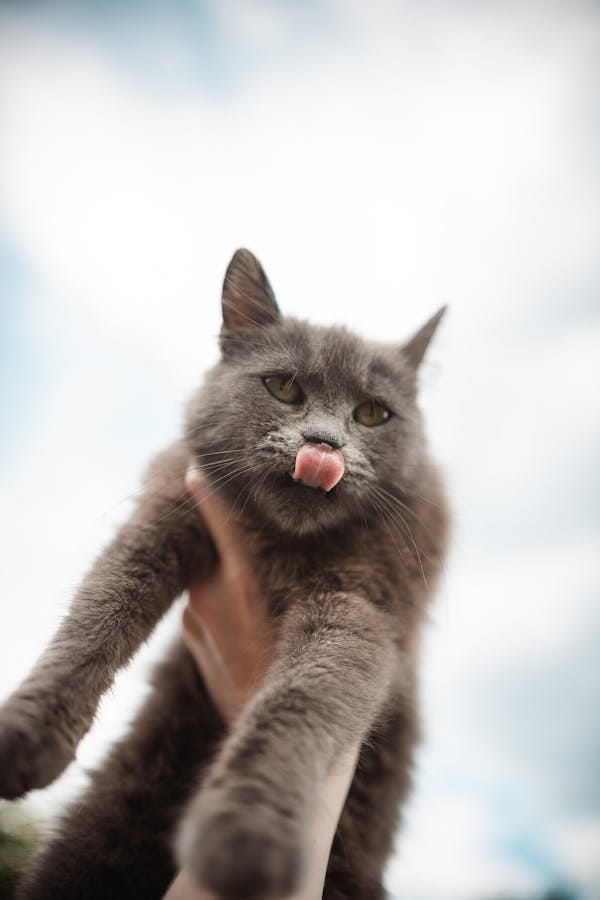
If you’re a cat owner, you might have experienced the peculiar sensation of your cat licking your ear.
While it can be an amusing and affectionate gesture, it often leaves many pet parents wondering about the reasons behind this behavior.
In this blog post, we’ll explore why your cat might be licking your ear and offer some tips on managing this behavior.
Reasons Why Your Cat Licks Your Ear
Show of affection and bonding
One of the main reasons your cat licks your ear is to show love and strengthen your bond.
Grooming is a natural social behavior for cats, deeply rooted in their history.
In the wild, cats groom each other to reinforce the social bonds within their group.
When your cat licks your ear, it’s their way of saying, “I love you and trust you.”
It’s similar to how they would groom another cat they care about, indicating that they consider you part of their family.
- Related post: Why Does My Cat Lick My Face? 5 Reasons To Know
- Related post: Why does my cat lick me: Top 5 Reasons for this Behaviour
The allure of earwax
This might sound strange, but earwax can actually be quite appealing to some cats.
Earwax contains fatty acids and cholesterol, which might have an interesting taste or smell for them.
The unique scent of earwax can trigger your cat’s curiosity and prompt them to lick your ears.
While it may seem odd, it’s a fairly common behavior observed in many cats.
Seeking attention
Cats are smart and often engage in specific behaviors to get their owner’s attention.
If your cat notices that licking your ear gets a reaction from you—whether it’s a laugh, a pet, or even a gentle reprimand—they might keep doing it.
This behavior can be especially common if you don’t typically give them much attention around their ears or if they’re just seeking more of your attention in general.

Should You Let Your Cat Lick Your Ear?
Health considerations
While your cat licking your ear can be a sweet and affectionate gesture, there are some health factors to consider.
If your cat spends a lot of time outdoors or has ear infections, it’s better to discourage this behavior.
Here’s why:
- Bacteria and parasites: Outdoor cats can pick up bacteria or parasites that could be transferred to you through licking.
- Ear infections: If your cat has an ear infection, the bacteria or yeast in their ears could be harmful. When they lick your ear, these harmful microorganisms could be ingested by either of you, potentially causing more health problems.
Alternatives for affection
If you’re not comfortable with your cat licking your ear, don’t worry—there are plenty of other ways to show affection and bond with your furry friend.
Here are some alternatives:
- Chin scratches: Most cats love having their chins scratched. It’s a spot they can’t easily reach themselves, and it feels great for them.
- Petting sessions: Spend some time gently petting your cat. This can be a soothing and enjoyable activity for both of you.
- Gentle massages: Try giving your cat a gentle massage, focusing on areas like their back, neck, and behind their ears.

Tips to Manage Ear-Licking Behavior
Redirect attention
One effective method to manage your cat’s ear-licking behavior is to redirect their attention.
You can use toys or treats as distractions. Here’s how:
- Toys: When your cat starts licking your ear, gently guide them towards a favorite toy. This shifts their focus from your ear to something more appropriate for them to play with.
- Treats: Offering a treat when they begin licking your ear can also help. This creates a positive association with the alternative activity.
Grooming sessions
Regular grooming sessions can satisfy your cat’s need for grooming behaviors.
Here’s what you can do:
- Brush or comb: Use a brush or comb to groom your cat. This mimics the sensation they might be seeking through ear licking.
- Health benefits: Not only does this reduce the likelihood of them licking your ear, but it also helps keep their coat healthy and free of tangles.
Ear hygiene
Keeping your ears clean can make them less appealing to your cat.
Here’s how to maintain ear hygiene:
- Regular cleaning: Wipe your ears with a damp cloth regularly. This reduces the amount of earwax that might attract your cat.
- Reduce allure: Ensuring your ears are clean and free from excessive earwax can help deter your cat from licking them.
Bonding activities
Engage in bonding activities that don’t involve ear licking.
Play with your cat using interactive toys, spend time petting them, or even talk to them.
These activities can help strengthen your bond and provide the attention and affection your cat is seeking, without involving your ears.
- Read also: Why do cats lick you then bite you – Here are the reasons why!
- Read also: Answered: How Often Should I Groom My Cat?

Conclusion
Understanding why your cat licks your ear can help you manage this behavior effectively.
Whether it’s a sign of affection, a fascination with earwax, or a plea for attention, there are ways to redirect this behavior while still maintaining a strong bond with your cat.
By offering alternatives and engaging in bonding activities, you can ensure both you and your feline friend are happy and healthy.
FAQs
While it’s generally safe, there are some hygiene considerations. If your cat has been outdoors or has an ear infection, it might be best to discourage the behavior.
Redirect their attention with toys or treats, offer regular grooming sessions, keep your ears clean, and engage in alternative bonding activities.
Earwax contains fatty acids and cholesterol, which some cats find interesting due to its taste and smell.
Chin scratches, petting sessions, gentle massages, and interactive play are great alternatives to ear licking for showing affection.
- Does Cat Litter Melt Ice? The Complete Guide to Winter Safety - January 30, 2026
- Happy Tail Dogs: Understanding This Common Canine Condition - January 29, 2026
- How Cold Can Outdoor Cats Handle? Feline Winter Safety - January 27, 2026


GIPHY App Key not set. Please check settings